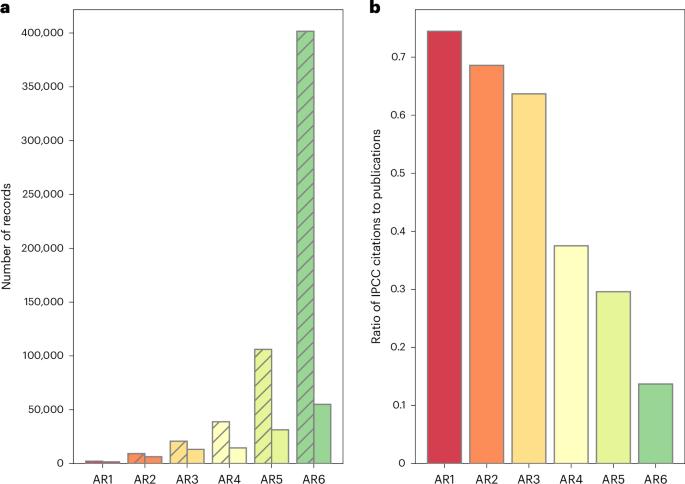Recommendations for producing knowledge syntheses to inform climate change assessments
IF 27.1
1区 地球科学
Q1 ENVIRONMENTAL SCIENCES
引用次数: 0
Abstract
Climate change assessments (CCAs) play a critical role in taking stock of the available science and other forms of knowledge and informing policy processes. As the underlying evidence base increases exponentially, the complexity also increases and challenges CCA author teams to capture all the relevant knowledge. Therefore, CCAs will need to transition from predominantly assessing primary research to focusing on the assessment and critical appraisal of knowledge syntheses of such work, alongside capturing knowledges held outside traditional scientific sources. To support this, a stronger knowledge synthesis culture is needed, and we propose key recommendations and offer guidance for producing robust, transparent, reproducible, inclusive and timely syntheses that can inform CCAs across scales. Climate change assessment reports are increasing in complexity as the knowledge base grows exponentially. In this Perspective, the authors advocate, and provide recommendations, for knowledge synthesis to become more common as a way to better inform such assessments.


为气候变化评估提供综合知识的建议
气候变化评估(CCAs)在评估现有科学和其他形式的知识以及为政策进程提供信息方面发挥着关键作用。随着潜在的证据基础呈指数级增长,复杂性也在增加,这给CCA作者团队捕获所有相关知识带来了挑战。因此,CCAs将需要从主要评估初级研究转变为注重对这些工作的知识综合的评估和批判性评价,同时获取传统科学来源之外的知识。为了支持这一点,需要一种更强大的知识综合文化,我们提出了关键建议并提供了指导,以产生稳健、透明、可复制、包容和及时的综合,从而为跨尺度的cca提供信息。
本文章由计算机程序翻译,如有差异,请以英文原文为准。
求助全文
约1分钟内获得全文
求助全文
来源期刊

Nature Climate Change
ENVIRONMENTAL SCIENCES-METEOROLOGY & ATMOSPHERIC SCIENCES
CiteScore
40.30
自引率
1.60%
发文量
267
审稿时长
4-8 weeks
期刊介绍:
Nature Climate Change is dedicated to addressing the scientific challenge of understanding Earth's changing climate and its societal implications. As a monthly journal, it publishes significant and cutting-edge research on the nature, causes, and impacts of global climate change, as well as its implications for the economy, policy, and the world at large.
The journal publishes original research spanning the natural and social sciences, synthesizing interdisciplinary research to provide a comprehensive understanding of climate change. It upholds the high standards set by all Nature-branded journals, ensuring top-tier original research through a fair and rigorous review process, broad readership access, high standards of copy editing and production, rapid publication, and independence from academic societies and other vested interests.
Nature Climate Change serves as a platform for discussion among experts, publishing opinion, analysis, and review articles. It also features Research Highlights to highlight important developments in the field and original reporting from renowned science journalists in the form of feature articles.
Topics covered in the journal include adaptation, atmospheric science, ecology, economics, energy, impacts and vulnerability, mitigation, oceanography, policy, sociology, and sustainability, among others.
 求助内容:
求助内容: 应助结果提醒方式:
应助结果提醒方式:


